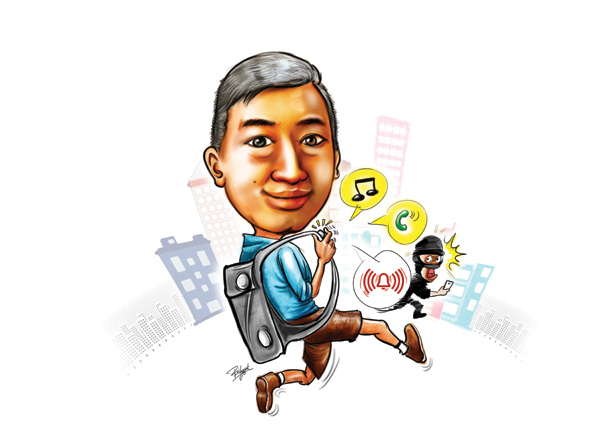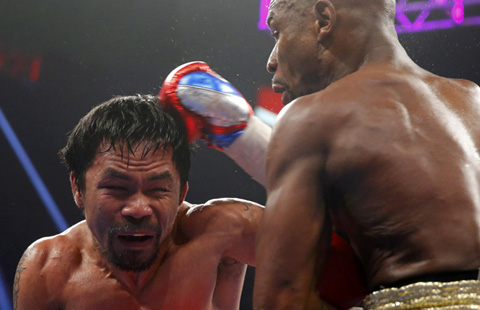Hello smarty, is my phone still there?
Updated: 2015-05-01 14:10
By Zhou Mo in Shenzhen(China Daily USA)
|
||||||||
 |
|
BILLY WONG /CHINA DAILY |
Editor's note: The innovative spirit among the tech-savvy generation has never ceased to amaze. A Shenzhen entrepreneur has come up with a magical, fashionable device to alert cell-phone owners whenever their phones are in danger of being pinched.
Since entering the mobile power-pack market four years ago, Shenzhen Lepow Creative Technology Ltd has been winning over the hearts of a growing number of customers with its fashionable and high-quality products.
Although still riding high on promising prospects in the electronics industry, the Shenzhen-based enterprise is determined to diversify - shifting part of its business to intellectual hardware.
"Strong winds are blowing across the intellectual-hardware field. We want to take advantage of this and make products with our own characteristics," says Lepow Vice-president Zhou Chaoran.
Lepow's magic is an innovative combination of intellectual hardware and fashion.

After a year's research and development, the company recently launched an intellectual pack that can raise an alarm when a cell-phone inside is in danger of being stolen. The "HiSmart Pack" is no different from ordinary ones in appearance, except that it has a silver round button on one of its shoulder straps.
The button is a chip in which Bluetooth is installed. The pack's alarm function is performed through the chip. When the cell-phone in the pack is connected with the chip through Bluetooth, the chip will recognize the distance between the pack and the phone automatically. When the phone is away from the pack for more than 10 meters, according to Zhou, the chip will send out an alarm, warning the owner his device is in danger of being filched.
In addition, the pack distinguishes itself from others in that it frees its users from holding on to their cell-phone all the time, while puffing out music, photography, positioning and other functions can be done with the "magical" chip.
"Bags are the most widely used among men. However, as a consumer myself, I feel that those in the market have various drawbacks - inconvenient, unfashionable or can be easily broken. Thus, we want to make a product to get rid of all these problems," explains Zhou.
For a company that excels in making mobile power packs, designing a fashionable pack with intellectual features is a big challenge. "We have had no any experience in this field. We did not know how to achieve the pack's function of size change. We did not know what materials to use for the pack. We were making explorations in the ocean," Zhou humbly recalls.
He thus bought different types of such packs from all over the world, analyzing their advantages and disadvantages for inspiration. "I went to Germany and other countries to buy various packs, brought them home and made a careful study of their characteristics."
Eventually, the time was up for taking the plunge. Having launched his entrepreneurial career nearly a decade ago, Zhou set up an advertisement company in 2006 with his longtime friend Fan Junping, who's now Lepow's chief executive officer.
The company grew steadily, but Zhou felt the bottleneck of its development. "The value we created from the advertising business was low and the impact was small. We aim to make our own brand and gain high recognition from the public," says Zhou.
"For me, whether a business deserves to succeed or not depends on whether it's able to create value."
Realizing what they truly have to achieve, Zhou and Fan quit the advertising venture and founded Lepow in 2011, specializing in producing fashionable mobile power packs.
Although Lepow's electronic products are winning over a bigger market share, Zhou felt the positive trend in the domain of intellectual hardware and stepped into the market decisively.
"Many of the wearable intellectual devices in future will be developed from ordinary articles in our daily lives, for example, shoes or hats. The combination of fashion and intelligence will have a big market," Zhou reckons.
In mid-March, Lepow resorted to crowd-funding on Indiegogo - a well-known crowd-funding platform in the US, raising $50,000 for the power-pack venture. The innovative product gained wide popularity on the website, with the company meeting its objectives within 30 hours after the funding effort began.
"HiSmart" is not the first intellectual pack that had come onto the market. Prior to that, GD, a kind of intellectual lady's bag, had already changed people's traditional perception of a handbag. With a 2600mAh battery installed, the bag relieves its owners' anxiety of their cell-phones running out of power in an emergency.
The intellectual-hardware market has been witnessing explosive growth in recent years. E-commerce giants and other prominent enterprises, including Baidu, Alibaba and Xiaomi, have joined in the fray.
According to a report by JD.com - one of the mainland's biggest e-commerce websites - sales of intellectual hardware through online platforms rocketed by 280 percent year-on-year, with roughly 8.7 million products sold in 2014. The industry's market scale is expected to reach 30 billion yuan ($4.8 billion) this year, the report says.
For Zhou, however, winning a huge market share is not his prime concern. What he values is a sense of identity from his clients. "It would be enough if a group of people like our products. We don't go after violent growth. We treasure the creation of wonderful works."
sally@chinadailyhk.com

 Ten photos you don't wanna miss during May Day holiday
Ten photos you don't wanna miss during May Day holiday
 The world in photos: April 27 - May 3
The world in photos: April 27 - May 3
 Fans dressed up to celebrate 'Star Wars Day' in Budapest
Fans dressed up to celebrate 'Star Wars Day' in Budapest
 China pavilion opens at Expo Milano 2015
China pavilion opens at Expo Milano 2015 New exhibition by Fondazione Prada offers new perspective on originality and imitation
New exhibition by Fondazione Prada offers new perspective on originality and imitation
 Mayweather beats Pacquiao by unanimous decision
Mayweather beats Pacquiao by unanimous decision
 Newborn British princess makes first appearance with royal
Newborn British princess makes first appearance with royal
 Quake-hit China-Nepal highway cleared
Quake-hit China-Nepal highway cleared
Most Viewed
Editor's Picks

|

|

|

|

|

|
Today's Top News
China becomes top source of US immigrants
Birthing center witnesses charged with violating court orders
LA protesters confront Abe face to face
Baltimore mayor lifts curfew 6 days after riots
More speculation in China's market as it's new
Consul general praises Beijing university to alumni
Manufacturing hub starts work on first zero-labor factory
New York City police officer shot in head while conducting patrol
US Weekly

|

|






